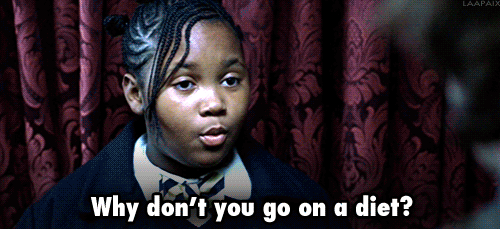 I vividly remember the first time I heard Meghan Trainor's "All About That Bass" on the radio. I was instantly hooked to her jazzy vocals. That's when I was hit with this line:
I vividly remember the first time I heard Meghan Trainor's "All About That Bass" on the radio. I was instantly hooked to her jazzy vocals. That's when I was hit with this line:
I recall feeling a distinct twinge of hurt. What started out as a fun song about embracing our bodies quickly became a celebration of curves - while attacking thin women. This has been a problem of mine for years.I'm bringing booty back
Go ahead and tell them skinny b**ches that
 Meghan's song caused my frustration with this back-and-forth between thin and curvier women to resurface. Why is there a divide? Why are we side-eying each other? Telling a plus-size woman to lose weight or telling a thin woman to "eat a burger" strengthens the culture of control that prevails in our society. Such statements, whether cruelly-intended or simply a bad joke, assume something like a jean size or a number on a scale is within every individual's complete control. This is where the cycle of self-criticism and the frustration that follows it begins.
Meghan's song caused my frustration with this back-and-forth between thin and curvier women to resurface. Why is there a divide? Why are we side-eying each other? Telling a plus-size woman to lose weight or telling a thin woman to "eat a burger" strengthens the culture of control that prevails in our society. Such statements, whether cruelly-intended or simply a bad joke, assume something like a jean size or a number on a scale is within every individual's complete control. This is where the cycle of self-criticism and the frustration that follows it begins.Our consumer culture relies on the low self esteem of the consumer. You may buy something because you feel it will help you "improve" - not simply because you even like it - and this is especially true if you are also being bombarded with imagery of "ideal" beauty oftentimes presented in marketing and advertising.
Laura Mulvey and David Mirzoeff, scholars from my days as an art history student, introduced me to the concept of "the gaze," which explores the power differentials that result from the relationship between an image subject and the image's viewer: "Women are to be looked at and put on display; both the camera apparatus and the male gaze regulate [them] and thus women can only identity with the self as an object." So, we see these (dominantly) male-purported advertisements and we see their supposed ideals, but not our own. Over and over again, we are told that we are not good enough and that there is an urgent need for us to change.
 As Naomi Wolf so poignantly said, "A culture fixated on female thinness is not an obsession about female beauty, but an obsession about female obedience. Dieting is the most potent political sedative in women's history; a quietly mad population is a tractable one."
As Naomi Wolf so poignantly said, "A culture fixated on female thinness is not an obsession about female beauty, but an obsession about female obedience. Dieting is the most potent political sedative in women's history; a quietly mad population is a tractable one."This spoke to me so strongly. I was reminded of it when The Thrillist's Adam K. Raymond wrote about his experience eating only food specifically marketed at women, such as Lean Cuisines, Luna Bars and calorie-measured desserts among other items. Adam admitted that, even after only two weeks of this regiment, "the constant reminder that I was or should be on a diet was exhausting."
I've calorie counted in the past, and that is exactly how I would describe it. It tires you. It controls your mind. And it suggests that you must limit yourself because you're flawed in a way that is not only inexcusable but also your fault. My self esteem plummeted, and I felt discouraged and unmotivated with not just my body, but my career and my relationships.
The flaws, however, are in the eye of the beholder. What if you didn't need to improve at all? What if we as women stopped tearing each other down in a hopeless competition and admired each other's beauty without doubting our own? If more women loved themselves the way we all deserve, we could also support each other and build each other up instead of labeling one another as "skinny b**ches." Let me know when that song comes out.
And, in case you're curious, here's what I look like - no label needed!
